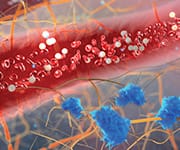Life Extension Magazine.
On May 20, 2022, a review article was published that described the hidden therapeutic potentials of carnosine.1
Carnosine was defined as "a molecule with multimodal mechanisms of action."
The paper revealed more than 1,000 studies published about the structure, function, and biological activities of carnosine under experimental and clinical conditions.
This 2022 published review advocates for more well-defined clinical trials to evaluate carnosine’s multiple mechanisms.
These human studies include evaluating carnosine’s potential to combat disorders as diverse as type II diabetes, Parkinson’s, and Alzheimer’s.
Twenty-two years ago, Life Extension® became the first to introduce the benefits of high-dose carnosine supplementation.
Since then, many readers have supplemented daily with 500 mg to 1,000 mg of carnosine.
Slow the Aging Process
An often overlooked cause of accelerated aging is glycation.
Glycation damage occurs when glucose interacts with the body’s proteins to form non-functioning structures.2,3
Carnosine is an anti-glycation compound that also suppresses free radicals and persistent inflammatory reactions.4
Daily supplementation with carnosine has been found to improve a range of outcomes associated with:5
- Cognition and exercise capacity in young and elderly adults,
- Physical performance and quality of life in individuals with heart failure,
- Glucose metabolism in overweight or obese non-diabetic and prediabetic individuals, and
- Neurological outcomes (balance and locomotion) in Parkinson’s disease patients and elderly adults.
What is Carnosine?
Carnosine is a compound composed of two amino acids linked together (a dipeptide).
It reduces or blocks glycation, rejuvenates aged cells, and more.4,6
These actions hinder processes that contribute to age-related disorders.
Dangers of Glycation
Glycation occurs when glucose (sugar) attaches to proteins, DNA, and lipids (fats), forming toxic compounds called advanced glycation end products (AGEs).
These AGEs damage cells, tissues, and organs.4
Glycation occurs at a faster rate in those suffering from diabetes because they have elevated blood sugar that binds to the body’s proteins. But it occurs in everyone over time.7,8
An Anti-Glycation Nutrient
Carnosine stands out because of its ability to prevent and reduce the impact of glycation.
It can inhibit the formation the toxic compounds resulting from excessive blood sugar, preventing them from damaging proteins.9,10
A systematic review of 36 articles on the impact of carnosine presented findings about its anti-glycation properties.11
One randomized controlled trial found that compared to placebo, diabetic patients receiving 1,000 mg of carnosine each day for 12 weeks had significant improvements in fasting blood glucose, serum triglycerides, and HbA1c levels.12
The HbA1c blood test is one way that we can measure the extent of glycation in the body.
Increased Longevity
Carnosine’s ability to reduce glycation, oxidative stress, and chronic inflammation4 makes it a promising candidate to slow aging processes.
In cultured cells, carnosine helped prevent senescence and rejuvenated the cells that already showed signs of senescence.6 Cellular senescence is closely linked to accelerated aging and development of disease.
It has also been shown, in cultured cells, to reduce the shortening of telomeres, the protective caps on the ends of chromosomes. Longer telomeres are associated with increased lifespan.13
In an animal study, treating aging-accelerated mice with carnosine increased the proportion of mice living into old age.14
Promoting Brain Health
Neurodegenerative diseases such as Alzheimer’s can result from protein glycation and oxidative stress that lead to the accumulation of toxic proteins.15
In models of Alzheimer’s, Parkinson’s, and aging, carnosine has shown benefits, including:4
- Reduction of toxic protein aggregation and inflammation in cell studies,
- Reduction in cognitive impairment, inflammation, and beta-amyloid accumulation in rodents, and
- Increase in antioxidant enzymes in cell and animal models of Parkinson’s disease and aging.
What you need to know
Reduce Glycation for Better Health
- Carnosine is a compound that is produced in the body. Levels decline with age.
- Carnosine helps block the toxic effects of glucose that drive accelerated aging and risk for age-related disease.
- This compound also reduces oxidative stress and inflammation. In preclinical trials it has prevented cellular senescence and inhibited the shortening of telomeres.
- In one animal study, carnosine increased the proportion of mice living into old age.
- In human studies, carnosine has demonstrated the ability to help ward off premature aging and chronic disease.
Controlling Diabetes and Metabolic Disease
According to the National Diabetes Statistics Report, almost 40 million Americans have diabetes. The numbers are even more worrisome regarding prediabetes (fasting blood sugar between 100 mg/dL to 125 mg/dL), which is present in almost 100 million adults 18 years and older.16
In animal models, carnosine improves glucose control and insulin sensitivity and blocks the progression of diabetes complications.17-21
In one mouse study, it even reduced or delayed the initial development of diabetes.21
In a randomized controlled clinical study in non-diabetic overweight and obese individuals, 12 weeks of daily carnosine improved the glycemic and insulin response to an oral glucose challenge.22
Know your numbers…
Here are the blood lab values that Life Extension considers optimal for three important metabolic parameters:
- Fasting Glucose: 80-86 mg/dL
- Fasting Insulin: <5 μIU/mL
- HbA1c: 5.0%-5.4%
A meta-analysis of 18 randomized controlled trials of supplements containing carnosine or related compounds found that they improved triglyceride and cholesterol levels.23
Cardiovascular Benefits
Poor glucose control and diabetes increase risk of heart disease. By improving metabolic health and shielding tissues from glycation, carnosine reduces that risk.
Several reviews have noted that carnosine may improve cardiac function and has potential benefits for prevention or treatment of cardiovascular disease and stroke.20,24-26
Congestive heart failure occurs when the heart cannot pump blood sufficiently, resulting in one or more symptoms that can include shortness of breath, fatigue, and accumulation of fluid in the abdomen or extremities.27 It can limit mobility and physical functioning, and severely impair quality of life.
In a study of patients with heart failure, participants were assigned to receive standard congestive heart failure medical therapy alone, or with added carnosine, 500 mg/day over a six-month period.28
Compared with the patients not taking carnosine, the supplemented group significantly improved their physical condition in a number of ways. Patients saw improvement in:
- Quality-of-life scores,
- Six-minute walking distance,
- Peak exercise workload, and
- The ability to deliver oxygen for use in tissues during exercise.
Summary
Oxidative stress, chronic inflammation, and glycation are underlying causes of aging and chronic disease.
Carnosine can fight all three. It is a powerful antioxidant and anti-inflammatory, and also anti-glycation compound.
These actions can benefit brain, heart, and metabolic health.
In an animal study, carnosine extended life. In clinical trials, carnosine has demonstrated improvements against several common chronic degenerative disorders.
We concur with a 2022 published review that advocates for well-defined clinical trials to fully evaluate carnosine’s multiple effects on human health.
The challenge is where to find funding!
Carnosine is an affordable dietary supplement and not a patented prescription drug. This means there is no financial incentive as there is with pharmaceuticals to spend many $millions of dollars on clinical trials.
If you have any questions on the scientific content of this article, please call a Life Extension Wellness Specialist at 1-866-864-3027.
References
- Caruso G. Unveiling the Hidden Therapeutic Potential of Carnosine, a Molecule with a Multimodal Mechanism of Action: A Position Paper. Molecules. 2022 May 20;27(10).
- Fournet M, Bonte F, Desmouliere A. Glycation Damage: A Possible Hub for Major Pathophysiological Disorders and Aging. Aging Dis. 2018 Oct;9(5):880-900.
- Kim CS, Park S, Kim J. The role of glycation in the pathogenesis of aging and its prevention through herbal products and physical exercise. J Exerc Nutrition Biochem. 2017 Sep 30;21(3):55-61.
- Solana-Manrique C, Sanz FJ, Martinez-Carrion G, et al. Antioxidant and Neuroprotective Effects of Carnosine: Therapeutic Implications in Neurodegenerative Diseases. Antioxidants (Basel). 2022 Apr 26;11(5).
- Menon K, Mousa A, de Courten B. Effects of supplementation with carnosine and other histidine-containing dipeptides on chronic disease risk factors and outcomes: protocol for a systematic review of randomised controlled trials. BMJ Open. 2018 Mar 22;8(3):e020623.
- Hipkiss AR, Cartwright SP, Bromley C, et al. Carnosine: can understanding its actions on energy metabolism and protein homeostasis inform its therapeutic potential? Chem Cent J. 2013 Feb 25;7(1):38.
- Bettiga A, Fiorio F, Di Marco F, et al. The Modern Western Diet Rich in Advanced Glycation End-Products (AGEs): An Overview of Its Impact on Obesity and Early Progression of Renal Pathology. Nutrients. 2019 Jul 30;11(8).
- Sergi D, Boulestin H, Campbell FM, et al. The Role of Dietary Advanced Glycation End Products in Metabolic Dysfunction. Mol Nutr Food Res. 2021 Jan;65(1):e1900934.
- Artioli GG, Sale C, Jones RL. Carnosine in health and disease. Eur J Sport Sci. 2019 Feb;19(1):30-9.
- Chmielewska K, Dzierzbicka K, Inkielewicz-Stepniak I, et al. Therapeutic Potential of Carnosine and Its Derivatives in the Treatment of Human Diseases. Chem Res Toxicol. 2020 Jul 20;33(7):1561-78.
- Ghodsi R, Kheirouri S. Carnosine and advanced glycation end products: a systematic review. Amino Acids. 2018 Sep;50(9):1177-86.
- Houjeghani S, Kheirouri S, Faraji E, et al. l-Carnosine supplementation attenuated fasting glucose, triglycerides, advanced glycation end products, and tumor necrosis factor-alpha levels in patients with type 2 diabetes: a double-blind placebo-controlled randomized clinical trial. Nutr Res. 2018 Jan;49:96-106.
- Shao L, Li QH, Tan Z. L-carnosine reduces telomere damage and shortening rate in cultured normal fibroblasts. Biochem Biophys Res Commun. 2004 Nov 12;324(2):931-6.
- Yuneva MO, Bulygina ER, Gallant SC, et al. Effect of carnosine on age-induced changes in senescence-accelerated mice. Journal of Anti-Aging Medicine. 1999;2(4):337-42.
- Hipkiss AR. Could carnosine or related structures suppress Alzheimer’s disease? J Alzheimers Dis. 2007 May;11(2):229-40.
- Available at: https://www.cdc.gov/diabetes/data/statistics-report/index.html. Accessed June 10, 2022.
- Albrecht T, Schilperoort M, Zhang S, et al. Carnosine Attenuates the Development of both Type 2 Diabetes and Diabetic Nephropathy in BTBR ob/ob Mice. Sci Rep. 2017 Mar 10;7:44492.
- Aldini G, Orioli M, Rossoni G, et al. The carbonyl scavenger carnosine ameliorates dyslipidaemia and renal function in Zucker obese rats. J Cell Mol Med. 2011 Jun;15(6):1339-54.
- Lee YT, Hsu CC, Lin MH, et al. Histidine and carnosine delay diabetic deterioration in mice and protect human low density lipoprotein against oxidation and glycation. Eur J Pharmacol. 2005 Apr 18;513 (1-2):145-50.
- Menini S, Iacobini C, Fantauzzi CB, et al. L-carnosine and its Derivatives as New Therapeutic Agents for the Prevention and Treatment of Vascular Complications of Diabetes. Curr Med Chem. 2020;27(11):1744-63.
- Sauerhofer S, Yuan G, Braun GS, et al. L-carnosine, a substrate of carnosinase-1, influences glucose metabolism. Diabetes. 2007 Oct;56(10):2425-32.
- de Courten B, Jakubova M, de Courten MP, et al. Effects of carnosine supplementation on glucose metabolism: Pilot clinical trial. Obesity (Silver Spring). 2016 May;24(5):1027-34.
- Menon K, Marquina C, Hoj P, et al. Carnosine and histidine-containing dipeptides improve dyslipidemia: a systematic review and meta-analysis of randomized controlled trials. Nutr Rev. 2020 Nov 1;78(11):939-51.
- Baye E, Ukropcova B, Ukropec J, et al. Physiological and therapeutic effects of carnosine on cardiometabolic risk and disease. Amino Acids. 2016 May;48(5):1131-49.
- Lombardi C. Carnosine: Potential aid for diabetes and cardiovascular disease. Obesity (Silver Spring). 2016 May;24(5):989.
- Roberts PR, Zaloga GP. Cardiovascular effects of carnosine. Biochemistry (Mosc). 2000 Jul;65(7):856-61.
- Available at: https://www.merckmanuals.com/professional/cardiovascular-disorders/heart-failure/heart-failure-hf. Accessed June 16, 2022.
- Lombardi C, Carubelli V, Lazzarini V, et al. Effects of oral administration of orodispersible levo-carnosine on quality of life and exercise performance in patients with chronic heart failure. Nutrition. 2015 Jan;31(1):72-8.







